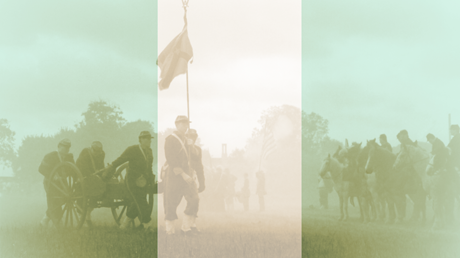How Civil War–era churches that avoided taking sides on slavery ended up siding with its supporters.

In antebellum and Civil War–era America, churches and denominations along the border between North and South voiced what would have been considered “moderate” opinions on slavery. But as April Holm shows in A Kingdom Divided, neutrality was attractive but never really neutral. It was a political choice like any other. Border-region evangelicals were not proslavery ideologues; neither were they abolitionists. Mostly, they believed churches should focus on “spiritual” matters and avoid weighing in on controversial political debates.
Slavery, however, was an all-encompassing system—the central fact of politics, economics, and culture, especially for white Southerners. As Holm puts it, the idea that the church “had no place promoting equality and freedom, or opposing racism and slavery,” was “neutrality” in theory only. “In practice, it was proslavery.”
Holm, director of the Center for Civil War Research at the University of Mississippi, studies the behavior of churches and denominational organizations in the border area—defined here as Delaware, Maryland, western Virginia, Kentucky, Missouri, and some part of each of their adjoining states. People living in this region initially thought of themselves as being part of “the West.” In the first third of the 19th century, migrants populated the region, thanks to Indian removal as well as forced slave migrations. By the mid-20th century, border residents thought of themselves as peaceful moderates. In practice, however, they were more anti-abolitionist than they were anti-slavery. As one editorialist in Louisville put it in 1846, “ABOLITIONISM IS A SIN.” Interestingly, in this regard, ...
from
http://feeds.christianitytoday.com/~r/christianitytoday/ctmag/~3/LmZg4QzekUE/april-holm-kingdom-divided-evangelicals-civil-war.html
No comments:
Post a Comment